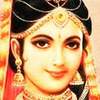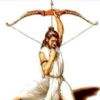This content was originally posted by: paartha
Again, respect your views but I have a slightly different take on it. Guess that is fine, since we are here to discuss and have our viewpoints.
I too wholeheartedly respect your views since I know that everyone will have different takes yet what binds us is devotion towards the Lord.
I feel each character in Mahabharat had some distinguishing trait such as devotion/friendship of Arjun to Lord Krishna, charitable quality of Karna, sticking to personal dharma such as in the case of Yudhistir, strictly adhering to vow like Bhisma, protective nature of Bhim, grit and determination of Draupadi, sense of justice of Vidhur and so on. So, it is not like everyone had same type of characteristics. I feel there was a special affection of Lord Krishna towards Arjun because of his devotion, friendship and innocence. It is clearly mentioned in Bhagwad Gita chapter 10 verse 37 (vrishneenaam vaasudevosmi paandavaanaam dhananjaya |
muneenaamapyaham vyaasaha kaveenaamushanaa kavihi) that amongst Pandavas, Arjun is his glory and called him as his Vibhuthi.
In the same Bhagavadgita, he also mentions that for him all are equal and he holds no special affection to one child of his. As far as I know, Kauravas were following adharma and thus he favoured Pandavas. Among Pandavas, he called Arjuna his glory, (paandavaanam dhananjaya). I have a slightly different take it. Does Dhananjaya refer to Arjuna alone? Does Vaasudeva refer to Krishna alone? We all know that Balarama is also a Vaasudeva. So when he said vrishneenaam vaasudevosmi, he said that among vrishnis, he is Balarama and Krishna. Now the next line. I know that throughout the epic Arjuna is referred to as Dhananjaya. But my pov is:
Dhanan + jaya = One who conquers over riches. We know that Arjuna conquered many kingdoms during the Rajasuya and thus got the name. But, didn't Bhima conquer many kingdoms as well? Doesn't that name refer to him as well? If Arjuna is Krishna's glory in paritraanaya saadhunam sense, then Bhima is his glory in vinaashayacha dushkritam sense. So, my analysis says that he referred to Bhima and Arjuna. 😊
I have loved these discussions, as you seem to have read Sanskrit texts and researching on your own too and seem to not lose your composure when reading views not matching yours.
Even I loved these, and will love to have more. Yes, I do not say I read, but I'm still reading and researching as Mahabharata and Pandavas are partially my life. 😳
I had many debates before so it's habitual for me to read opposing views as well. Some hurt me, some satisfy me, some makes me think, but I still respect everyone's opinions. 😊














comment:
p_commentcount